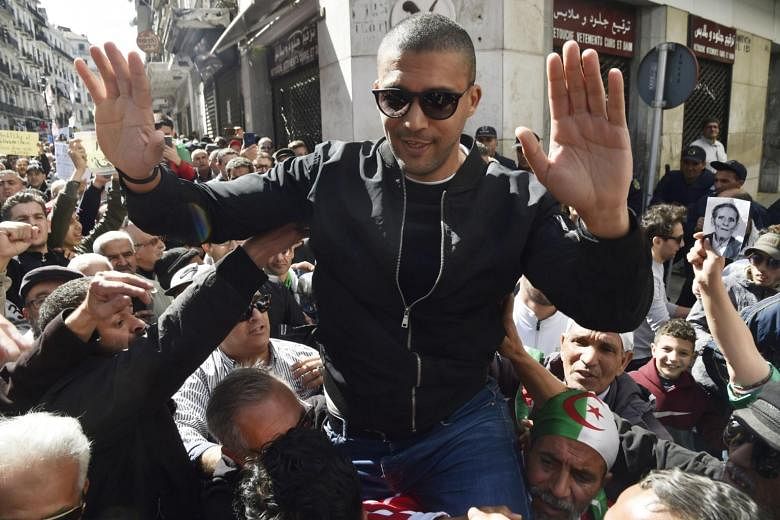ALGIERS (NYTIMES) - A prominent Algerian journalist was sentenced to three years in prison on Monday (Aug 10) for reporting on anti-government demonstrations, a lawyer and a human rights official said. It's the latest sign of a hardening crackdown on the press in Algeria, one that has drawn condemnation from international observers.
Journalist Khaled Drareni, 40, imprisoned since March after he reported on a demonstration of the protest movement known as the Hirak, was convicted by a court in Algiers for "inciting an unarmed gathering" and "endangering national unity."
The Hirak demonstrations swept Algeria in 2019, demanding reform and forcing the removal of the country's longtime ruler, Abdelaziz Bouteflika.
Both Drareni and his lawyers said he was jailed and convicted of nothing more than doing his job.
"The charges are completely empty," his lawyer, Abdelghani Badi, said in a statement. "All he did was give information, in words and images. He did nothing more than his work as a journalist."
"Even on the day of his arrest, he was only doing his job," said Badi. "Justice in Algeria serves the ruling power and the system, not the people and the state."
The new government that replaced Bouteflika has shown itself to be increasingly intolerant both of the ongoing protest movement and of the Algerian journalists who report on it, analysts say. At least five other journalists besides Drareni have been convicted in recent months or are imprisoned awaiting trial. Several leaders in the Hirak movement have been arrested and released.
The Hirak movement never accepted the legitimacy of Bouteflika's successor, Abdelmadjid Tebboune, a prime minister in the previous government, saying his election in December, boycotted by the political opposition, was flawed. It continues to call for political reform and an end to military interference in the country's politics.
There were hopes that Tebboune's new government would prove more open to reform than Bouteflika's autocratic regime. But Amnesty International said in a statement in June, after 500 demonstrators were arrested, that "the promises of the authorities to listen to the protest movement are far from having been translated into fact."
The International Crisis Group said in a recent report that the tightening of security in Algeria has become "palpable," and noted that it was taking place against a backdrop of an economic crisis and falling oil and gas prices, which the government depends on for most of its revenue.
Large-scale purges and arrests in the country's business class have led to the shutdown of roughly 60 per cent of public-works firms.
Drareni is the editor of the influential website Casbah Tribune and a correspondent for the French television station TV5 Monde and Reporters Without Borders.
On Aug 3 he told the Algiers court by video: "I was only doing my job as a free and independent journalist. I covered all the demonstrations tied to the Hirak movement, even those that were pro-government. It was my duty to do so."
State prosecutors had called for an even stiffer sentence than the three years.
Drareni's conviction was "arbitrary, absurd and violent," the head of Reporters Without Borders, Christophe Deloire, said in a statement Monday.
"This is clearly about the judicial persecution of a journalist who gives honour to his country," Deloire said.
Zoubir Arous, a sociologist in Algiers, compared the new regime with the Bouteflika era.
"Nothing's changed," he said. "And it's going to get worse."
The US-based Committee to Protect Journalists said Drareni's detention and the charges against him "make a mockery of Algerian President Abdelmadjid Tebboune's reform pledges and put the country back on an ugly path toward muzzling dissent."
Faced with the coronavirus pandemic, Hirak's leaders had called for a suspension of weekly demonstrations on March 17. The International Crisis Group noted in its report that, since that time, security measures have "been felt even more strongly."
On April 22, the representatives in Algeria's rubber-stamp parliament proposed "criminalising" reporting that "threatened public order and state security."
Several online news outlets were then blacked out for criticising Tebboune.
Last month, Ali Djamel Toubal, a correspondent for Ennahar, a television network, was sentenced to 15 months in prison for broadcasting footage showing police officers mistreating anti-regime demonstrators. On July 28, two more journalists were arrested, before being released the next day.

